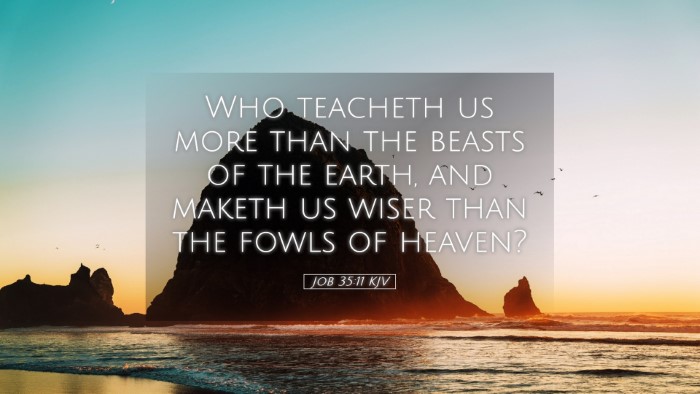Old Testament
Genesis Exodus Leviticus Numbers Deuteronomy Joshua Judges Ruth 1 Samuel 2 Samuel 1 Kings 2 Kings 1 Chronicles 2 Chronicles Ezra Nehemiah Esther Job Psalms Proverbs Ecclesiastes Song of Solomon Isaiah Jeremiah Lamentations Ezekiel Daniel Hosea Joel Amos Obadiah Jonah Micah Nahum Habakkuk Zephaniah Haggai Zechariah MalachiJob 35:11
Job 35:11 KJV
Who teacheth us more than the beasts of the earth, and maketh us wiser than the fowls of heaven?
Job 35:11 Bible Commentary
Commentary on Job 35:11
Job 35:11 states, "Who teaches us more than the beasts of the earth, and makes us wiser than the fowls of heaven." This verse offers profound insights into the nature of human understanding and the providential wisdom of God. The comparisons drawn between humanity and the animal kingdom reflect on the essential attributes of knowledge and divine instruction.
Contextual Background
To appreciate the depth of this verse, one must consider the context in which Job is situated. Job, enduring immense suffering and seeking answers about God’s justice, engages in a dialogue that reveals both his pain and his understanding of divine wisdom.
Insights from Commentaries
Matthew Henry's Commentary
Matthew Henry remarks on the significance of the comparison between man and the beasts of the earth. He states that while animals possess instinctual knowledge, it is God who provides humans with the higher faculty of understanding. This insight challenges individuals to recognize their dependency on divine guidance for true wisdom, unlike the instinct-driven actions of the animal kingdom.
Henry emphasizes that God's providence is evident in how He communicates wisdom to mankind. Humans, endowed with reason and the ability to comprehend divine truths, are thus called to reflect on their reliance on God’s instruction rather than the simplistic, instinctual knowledge of animals.
Albert Barnes' Notes
Albert Barnes interprets this verse as a claim to the superiority of divine revelation over mere human experience. He asserts that while animals may have an innate understanding to survive, humans are granted a superior wisdom through the teachings of God. Barnes highlights that God uses nature itself, through observable phenomena, to impart knowledge and understanding to humankind.
Barnes also draws attention to the idea that wisdom and intelligence are not solely the products of human effort; rather, they stem from God's instruction. The verse acts as a reminder to believers that their understanding of righteousness and morality is rooted in God's revelations and His word.
Adam Clarke's Commentary
Adam Clarke dives deeper into the implications of this verse in relation to God's authority as the ultimate teacher. He articulates that the comparison underscores the limitations of human wisdom when viewed apart from divine guidance. Clarke elaborates on how God has endowed humans with the ability to learn from both creation and scripture, shape understanding through experience, and develop morality and wisdom.
Furthermore, Clarke suggests that this verse serves to humble humanity by reminding them that their enlightenment in spiritual matters is not self-derived but is a gift from God. Thus, this divine teaching elevates human cognition above that of the animals, underscoring the intentional nature of God’s creation.
Theological Implications
The theological implications of Job 35:11 are significant for all readers, particularly for pastors and theologians. The verse underscores several themes:
- Divine Instruction: God's role as teacher highlights the necessity of divine revelation in acquiring wisdom.
- Human Dependency: Recognizing the limits of human understanding reinforces the need for divine guidance.
- The Value of Creation: Both animals and nature serve as mediums through which God instructs humanity, prompting a deeper appreciation for the natural world.
- Moral Accountability: With the wisdom imparted by God, humanity is held accountable for their understanding of righteousness and their actions.
Practical Applications
For pastoring and discipleship, Job 35:11 challenges leaders to guide their congregations in recognizing the sources of their understanding and wisdom. It encourages a return to Scripture as the primary fountain of truth from which believers should draw their understanding.
Moreover, for students and scholars, the call to reflect on the relationship between divine revelation and human wisdom is crucial. It prompts a critical examination of how knowledge is acquired and the role of God in all aspects of understanding.
Conclusion
In conclusion, Job 35:11 articulates the profound relationship between God’s teaching and human understanding, reminding believers of their origin as beings endowed with reason made capable of grasping divine truths. As Matthew Henry, Albert Barnes, and Adam Clarke elucidate, this realization calls for humility, gratitude, and a heartfelt pursuit of divine wisdom in every facet of life.


